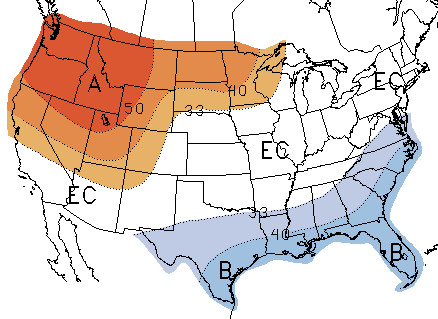Looking Ahead to February and Early Spring
Saturday, January 23rd, 2010We’re now about three fourths of the way through January, and just about two thirds of the way through Winter. December was 2.7 degrees colder then normal (15th coldest on record) and the second wettest on record, with 9.1 inches of rain. So far in January, Atlanta Hartsfield-Jackson airport is 5.4 degrees colder than normal, but with 2.19 inches of precipitation, only 54% of normal. With more rain predicted for Sunday, and again at the end of the week, we could easily get back to normal January precipitation of 5.03 inches. The verdict for the first part of Winter would have to be colder and wetter than normal.
Looking forward to February, and anticipating the groundhogs next month, the early part of spring, it looks like we can expect more of the same. The Climate Prediction Center released its February outlook earlier this week, which is reproduced below:


As is typical for El Nino winters, it’s likely to be colder than normal for much of the Southeast, and warmer than normal for the Northwest. The remainder of the country could be above or below normal. On the precipitation side, most of the southern half of the country will be wetter than normal, with equal chances of dry or wet weather in the north. The greatest chance of excessively wet weather is in southern California and Arizona, not welcome news for an area which has seen extensive flooding this week.
(more…)

